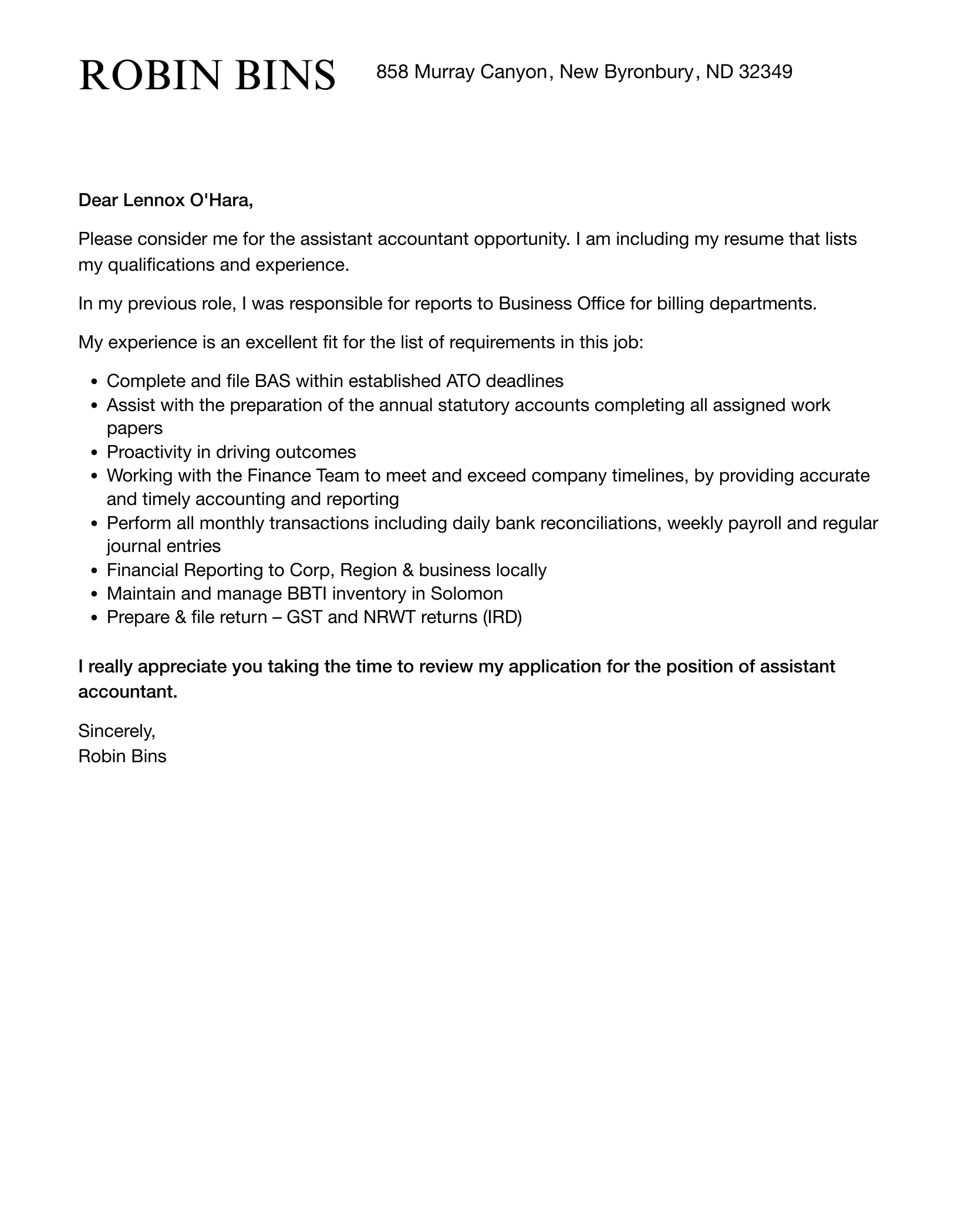Cover Letter for Accountant Assistant
Crafting a compelling cover letter is crucial for landing an Accountant Assistant position. Your cover letter is the first impression you make on a potential employer, and it offers a unique opportunity to showcase your skills, experience, and personality. It should complement your resume by providing detailed examples and explanations that highlight your suitability for the role. A well-written cover letter not only demonstrates your written communication skills but also your attention to detail, both highly valued in the accounting field. This guide provides essential tips to help you create a standout cover letter that gets you noticed.
Highlight Your Skills
Begin by listing your relevant skills. Focus on skills directly applicable to the Accountant Assistant role, such as proficiency in accounting software (e.g., QuickBooks, Xero), data entry, reconciliation, financial reporting, and general ledger maintenance. Also, include soft skills like organization, time management, communication, and problem-solving. The goal is to show how your skills align with the job requirements. Instead of simply listing skills, briefly explain how you have used these skills in previous roles. This provides context and adds credibility to your claims.
Quantify Your Accomplishments
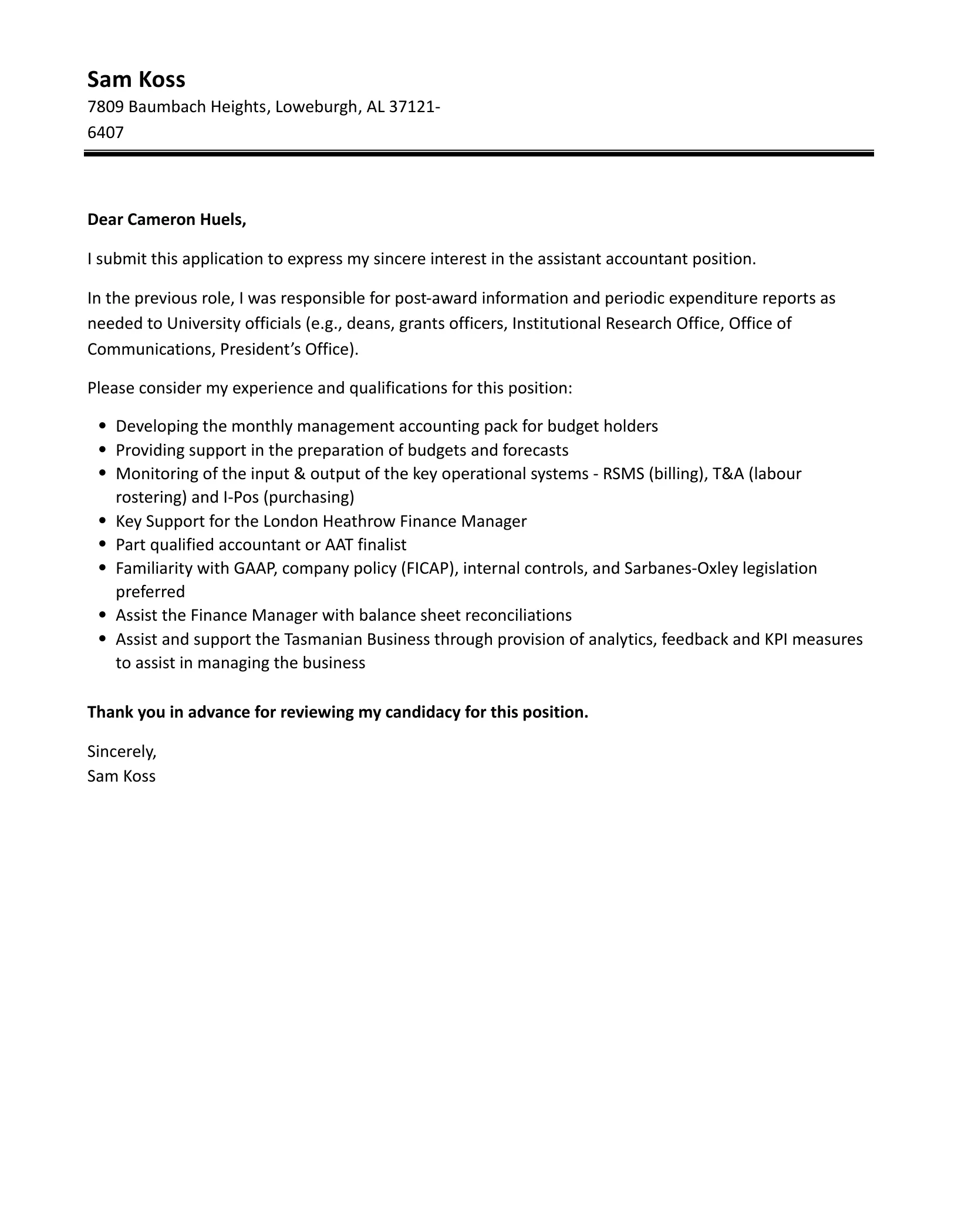
Whenever possible, quantify your achievements. Instead of saying ‘Improved efficiency,’ state ‘Improved data entry efficiency by 15% within three months.’ Numbers give concrete evidence of your capabilities. For example, mention any cost savings you’ve contributed to, the number of transactions you’ve processed, or the accuracy rate of your financial reports. Providing measurable results makes your cover letter more impactful and shows potential employers the value you can bring to their team. Always ensure these figures are accurate and verifiable.
Tailor to the Job Description
Customize each cover letter for the specific job and company. Carefully read the job description and identify the key requirements and keywords. Then, align your skills and experience with those requirements. This shows the employer that you understand their needs and have taken the time to tailor your application. Research the company’s values, mission, and recent projects to demonstrate your interest and show how your skills can contribute to their success. This level of personalization significantly increases your chances of getting an interview.
Proofread Meticulously
Proofreading is critical. Errors in grammar, spelling, or punctuation can undermine your credibility and professionalism. Read your cover letter multiple times, and consider asking a friend or colleague to review it as well. Pay close attention to the tone and flow of your writing to ensure it is clear and concise. A polished cover letter reflects your attention to detail and your commitment to excellence, essential qualities for an Accountant Assistant.
Use a Professional Tone
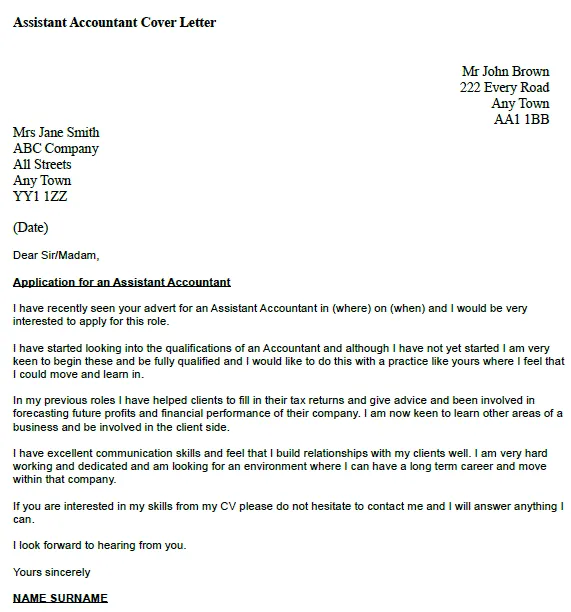
Maintain a professional tone throughout your cover letter. Avoid casual language, slang, or overly familiar phrasing. Use a formal salutation (e.g., ‘Dear Mr./Ms. [Last Name]’) and a professional closing (e.g., ‘Sincerely’). Be clear, concise, and respectful in your communication. Ensure that your language conveys confidence and competence without being arrogant. Your cover letter should reflect the standards of professional communication expected in the accounting field.
Formatting and Structure
The layout of your cover letter matters. A well-structured cover letter is easy to read and visually appealing. Proper formatting enhances readability and allows the hiring manager to quickly find the most important information. Always use a clear, professional font such as Times New Roman, Arial, or Calibri, with a font size between 10 and 12 points. Use single spacing within paragraphs and double spacing between paragraphs. Ensure proper alignment (left-justified is standard) and use clear headings and bullet points where appropriate.
Contact Information
Include your contact information at the top of your cover letter. This should include your full name, phone number, email address, and LinkedIn profile URL (optional). Make sure your email address is professional and that your voicemail greeting is also professional. Including this information makes it easy for the hiring manager to contact you for an interview.
Salutation
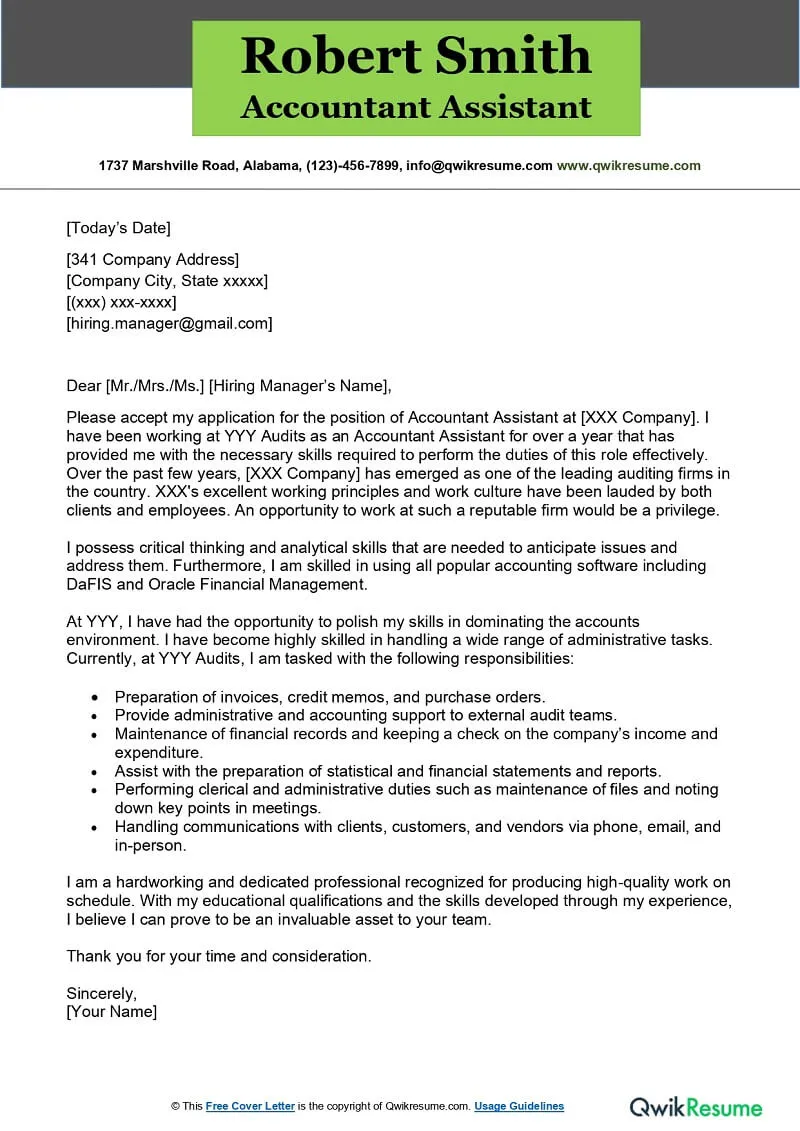
Start your cover letter with a professional salutation. If possible, address the hiring manager by name (e.g., ‘Dear Mr./Ms. [Last Name]’). If you cannot find the hiring manager’s name, use a general salutation like ‘Dear Hiring Manager.’ Avoid using generic salutations such as ‘To Whom It May Concern,’ which can make your letter seem impersonal.
Body Paragraphs
The body of your cover letter should be concise and well-structured. Typically, it includes an introductory paragraph, two or three body paragraphs, and a closing paragraph. In the introductory paragraph, state the position you are applying for and how you found the job. The body paragraphs should highlight your relevant skills and experience, providing specific examples of your accomplishments. Each paragraph should focus on a key aspect of your qualifications. Use strong action verbs and keep paragraphs relatively short for easy reading. The closing paragraph should reiterate your interest and express your availability for an interview.
Closing
End your cover letter with a professional closing. Use a formal closing phrase, such as ‘Sincerely,’ ‘Best regards,’ or ‘Thank you for your consideration.’ Sign off your cover letter by typing your full name. If you are sending a physical letter, include your handwritten signature above your typed name.
Keywords and Phrases
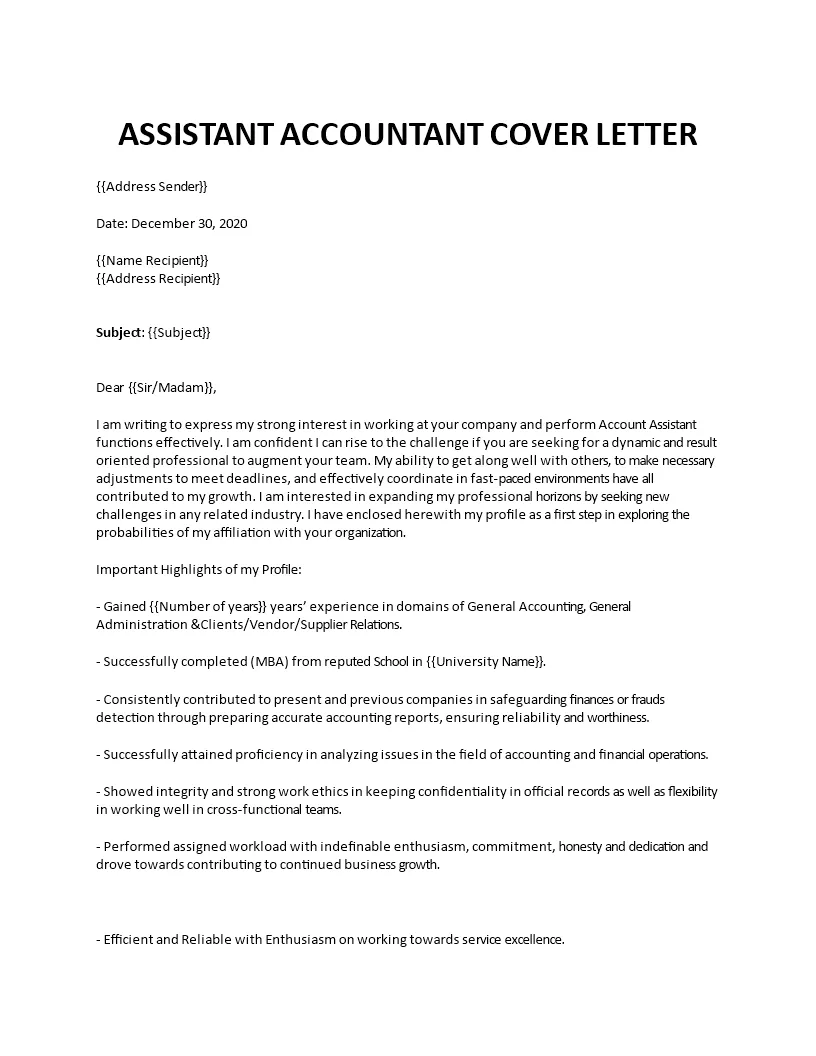
Optimizing your cover letter with relevant keywords and phrases increases its visibility to applicant tracking systems (ATS). ATS are used by many companies to scan and filter resumes and cover letters. Include keywords that match the job description to ensure your application is considered. Pay attention to the specific skills and qualifications listed in the job posting, and incorporate those phrases naturally into your cover letter. This can increase your chances of your cover letter being selected for review by a human.
Industry-Specific Jargon
Use industry-specific jargon and terminology to demonstrate your knowledge and experience. Include terms relevant to accounting, such as ‘GAAP,’ ‘IFRS,’ ‘budgeting,’ ‘forecasting,’ ‘accounts payable,’ ‘accounts receivable,’ and ‘financial statements.’ However, make sure you only use terms you fully understand, and use them appropriately. Overusing jargon can be confusing, so maintain a balance between technical language and clear communication.
Action Verbs
Use strong action verbs to describe your accomplishments and responsibilities. Action verbs make your cover letter more dynamic and engaging. Start sentences with verbs like ‘managed,’ ‘analyzed,’ ‘prepared,’ ‘reconciled,’ ‘implemented,’ ‘improved,’ ‘reduced,’ ‘developed,’ and ‘coordinated.’ These verbs bring your experience to life and provide a clear picture of your contributions in previous roles.
Demonstrate Enthusiasm
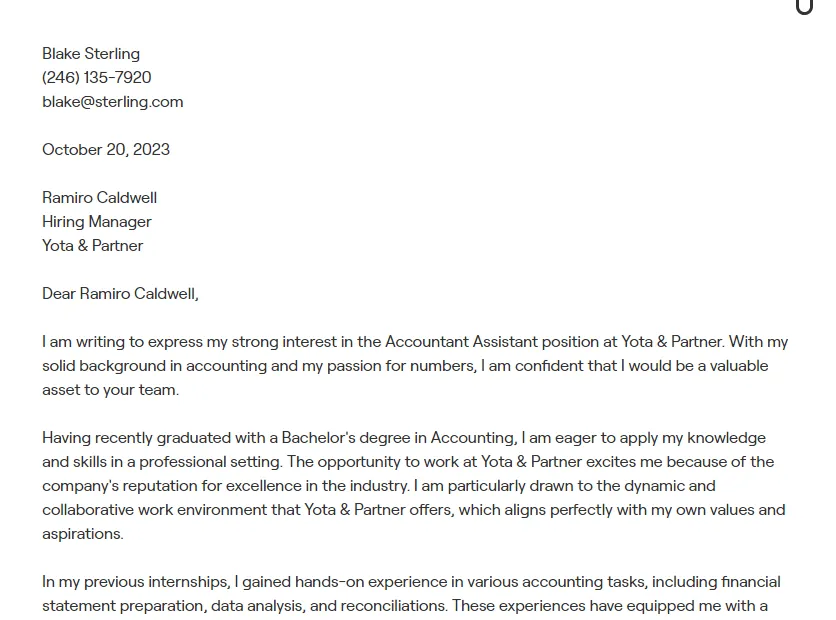
Show genuine enthusiasm for the Accountant Assistant position and the company. Your cover letter should convey your excitement about the opportunity and your eagerness to contribute to the team. Demonstrate your understanding of the company’s mission, values, and goals, and explain how your skills align with their needs. This enthusiasm will make your application stand out from the competition. Let your personality shine through while maintaining professionalism.
Research the Company
Thoroughly research the company before writing your cover letter. Understand their business, their culture, and their recent achievements. This will allow you to tailor your cover letter to the specific needs of the company and demonstrate your genuine interest. Look for information on their website, social media, and news articles. Showing that you have researched the company demonstrates your initiative and commitment.
Express Your Interest
Clearly express your interest in the Accountant Assistant position and the company. In your closing paragraph, reiterate your enthusiasm and state your availability for an interview. Include a specific call to action, such as ‘I am eager to discuss how my skills and experience can benefit your team’ or ‘I am available for an interview at your earliest convenience.’ This shows that you are proactive and ready to take the next steps.
